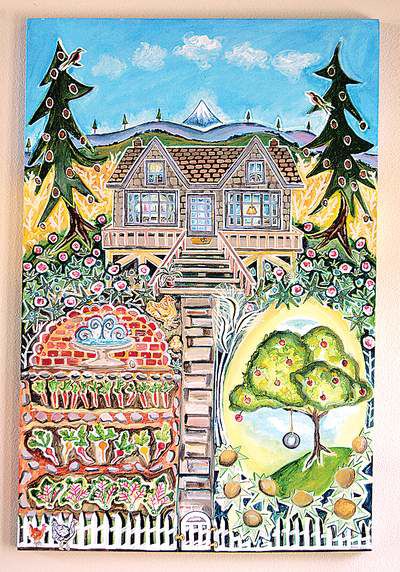Helping at Ronald McDonald House
Published 5:00 am Saturday, September 11, 2010

- A painting by Melinda Springer hangs at the Bend Ronald McDonald House in thanks for the positive experience she had after her son was born 12 weeks prematurely four years ago. Today, he’s a healthy, beautiful child, says his proud grandmother and house volunteer, Carol Wellock.
Carol Wellock considers herself a professional volunteer.
Among several other places, she volunteers at the Bend Ronald McDonald House. Like other Ronald McDonald Houses around the country and world, the house on Purcell Boulevard provides a home away from home for families whose children are receiving medical treatment at an area hospital.
In Bend, that means a sanctuary with a private room that sleeps up to six and a shared kitchen, entertainment room, large backyard with playground equipment and other accoutrements families can use between appointments at nearby St. Charles Bend.
Wellock, 62, began volunteering at the house three years ago, choosing to give back to this particular institution for a personal reason: her grandson, Milo Springer, who was born prematurely in June 2006.
Sitting on a couch in a common area of the house, Wellock explains how her daughter, Mindy Springer, of Lyle, Wash., had been 28 1/2 pregnant when she and her husband, Matt, took a rafting trip down the John Day River.
“She had her doctor’s permission, everything seemed fine, but the unthinkable happened. She went into labor. It wasn’t until … nighttime when she realized she was in full labor. It’s just a ridiculous story,” Wellock says, chuckling. “She didn’t feel well during the day, but kept pushing it aside. She thought she was nervous, thought she was excited about the trip.”
Out of cell range, the group of about 10 — which included a nurse — made camp for the night. But, as Wellock points out, “it wouldn’t have mattered who was there, when you’re in the middle of the woods and you’re 12 weeks early.”
“It was too late to go back, and they couldn’t go forward. So she sat in a tent all night and willed her baby not to be born. Literally, that’s all it was,” says Wellock.
‘This is unbelievable’
Skeptics may want to skip ahead a few graphs. Wellock’s voice is hushed when she adds, “Actually, if you want the dramatic part of the story, the dramatic part was that she said she had to get into a zone so that she could concentrate on not having the baby. She said that my father came to her. My father, at that time, was 96 years old, still living in his own house in Mt. Vernon, New York.
“This gets worse; I don’t know if you even want to put it (in),” Wellock tells a reporter. “This is unbelievable. She said his presence was there. He had died that afternoon. And of course we couldn’t tell her … it was just an unbelievable thing. There was no reason for him to have died. He was in perfect health. It just happened.
“It even went through her head, ‘Why Pop? Why is he here? He’s old; I shouldn’t be using up all his energy,’ ” Wellock says.
Despite the contractions, and regardless of what got her through that long night, the baby stayed put. The group got back under way before dawn, heading downstream on the John Day. A friend along on the trip paddled his canoe alongside the raft on which Mindy and Matt were joined by the nurse.
“They didn’t even (see) a light in the pitch darkness that it was until an hour and 45 minutes later,” Wellock says. “I always say that’s the second angel. There was a woman who came down and helped them, an older woman who, thank goodness, had a land line.”
Mindy was flown by AirLink Critical Care Transport to St. Charles Bend. Thirty-six hours later, Milo Springer was delivered by cesarean section, weighing 2 pounds 13 ounces. He was “pink and breathing, thank goodness,” Wellock says.
For seven weeks, Mindy and Matt stayed at the Ronald McDonald House while Milo steadily improved in the Neonatal Intensive Care Unit. He’s now healthy and beautiful, Wellock says.
“If it weren’t for the Ronald McDonald House, I don’t know what they would have done. I don’t,” says Wellock, sighing. “It would have been nuts. … Matt was lucky enough. He found work in Bend for that summer. And Mindy just spent her time at the NICU.”
Moving to Bend
Wellock says she and husband Jim “came here, of course, to see them. We fell in love with our grandson, but fell in love with Bend, also.”
They liked Bend enough to want to move here from Poughkeepsie, N.Y., Bend being “a whole lot closer” to family. Their other daughter, Sara, lives in San Francisco. Mindy and Matt divide their time between Utah and Lyle, located on the Columbia River about midway between Hood River and The Dalles. It’s “three easy hours” away from Bend. “I can’t explain that to people in New York, like, ‘You drive for three hours, but you don’t see another car. No traffic!’ ”
But first, “we had to decide to retire,” says Wellock, who was a teaching assistant working with special education students. “We had no plans to retire.”
In the end, the decision to leave New York was easy, she says.
“We’ve never done anything like that in our lives. But we came here, and of course, saw our grandson and daughter and son-in-law, but they were busy with the baby. So we had nothing to do, and we just started driving around here and literally fell in love with Bend,” she says. “We kind of started looking at houses for fun and said, ‘You know what? We’re going to move here.’ ”
They bought a house before 2006 was through, settled their affairs back east, and moved into the house in September 2007.
“I used to say, ‘I’m going to move to Bend and I’m going to volunteer at the Ronald McDonald House,’ ” she says. She began volunteering at the Bend Ronald McDonald House just a month after the move.
Wellock has already logged more than 200 miles walking Pilot Butte. She’s also a practitioner of Iyengar yoga, which she considers her main activity.
And, of course, there’s volunteering. One of three core volunteers at Ronald McDonald House, she’s there doing tasks from cleaning and folding laundry to clerical work for a total of two to four hours a week.
During an annual Central Oregon Open golf tournament that benefits Ronald McDonald House Charities, that number may jump to 10 hours. “I’m here when they need me. I live close by, so if there’s something they need me to do, I say, ‘Just call and I’ll be by.’ ”
One day a week, Wellock, a cancer survivor herself, prepares food for a cancer support group that meets there.
“I love just being able to be here for them,” she says.
‘It’s a family’
Her best memories of the past three years of volunteering are of “seeing the little babies,” she says. “Babies that have been in the NICU, seeing the mothers bring them here, ready to go home. I think those are the clearest memories, getting to see those babies that have kept them in the house for all this time, and then seeing them healthy and ready to leave. And that’s a bunch of them.”
According to Mardi Bruce, house manager, “We used something like 2,000 volunteers the last couple of years.” That includes one-time volunteers, such as Scout troops and school groups. “People will call and want some opportunities. Individuals, families: All kinds of people volunteer.”
Wellock would recommend volunteering at the house to anyone.
“The nature of this house is that it’s a family. I felt like the house gave back more to me than I was giving it. It was my family when I came here,” she says.
Though she always volunteered at her daughters’ schools and activities when they were younger, Wellock has hit her volunteer stride in retirement. She volunteers regularly with Healthy Beginnings, the Tower Theatre and Bend Public Library about three hours a week. Occasionally, she volunteers with Bend’s Community Center and other organizations. She wishes she could volunteer more.
“It’s been hard. I’m tempted to do other things, but I know I have to leave some free time. I’m supposed to be retired. I call myself a professional volunteer,” she says, “because it’s one big job.
“It sounds so silly, but I really consider it such a privilege to be able to volunteer. To be well and to be healthy and still have energy and to be able to volunteer, it’s really perfect.”







